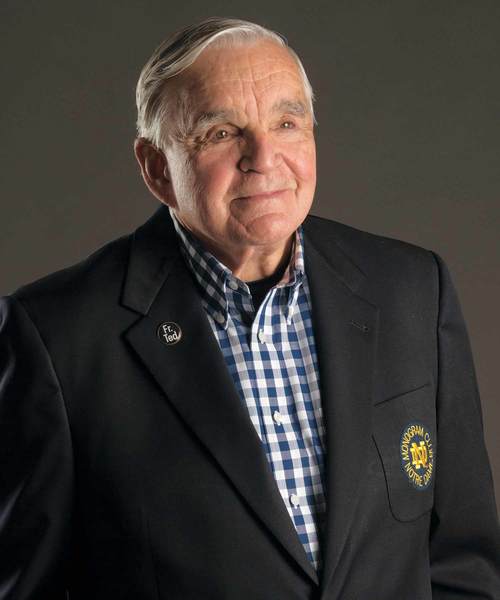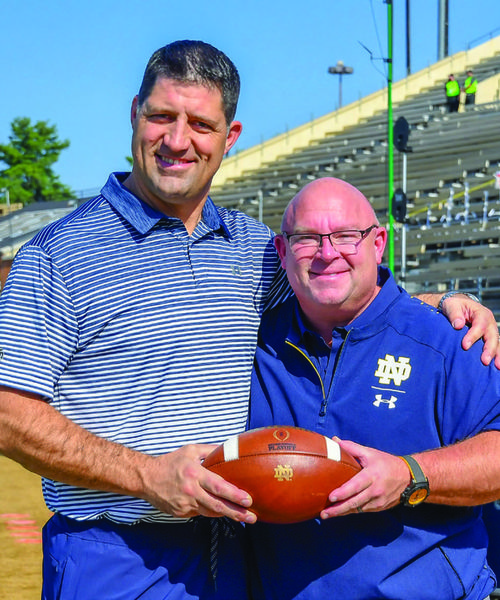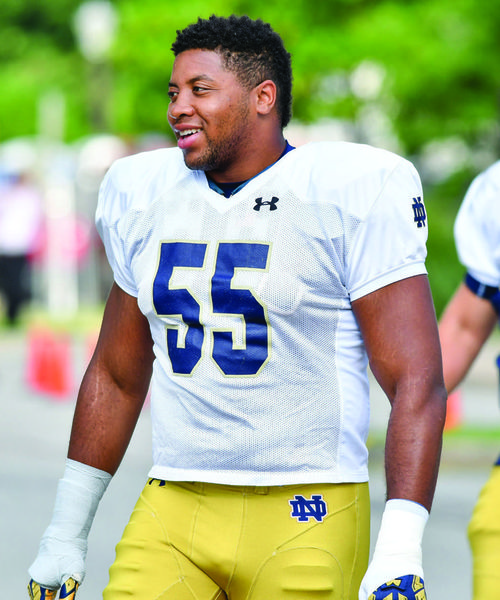
Marty Allen
He found a million ways to help
When Marty Allen, chairman emeritus and lifetime member of the board of trustees of the Gerald R. Ford foundation, reflects on his career, community and service accomplishments, he seems truly amazed, grateful and blessed at how his bountiful life has unfolded.
And it absolutely involves the University of Notre Dame—over the course of a lifetime, in fact.
“The only goal I ever really set for myself was to become a student manager for the football team at Notre Dame,” says Allen, a Grand Rapids, Michigan, native who passed up an appointment to the U.S. Naval Academy to attend the then all-male, Catholic university about 120 miles south of his hometown.
“Yet, I can trace a common thread, from the time I got out of Notre Dame and the Navy and through what I’ve done since, to being the football student manager at Notre Dame.”
When Allen arrived on campus in 1954, he was among perhaps a hundred undergraduates who applied for jobs as student managers for the nine Irish varsity sports teams. In those days, when the athletic department staff directory barely filled a page, student managers handled a variety of duties, including making travel arrangements, procuring and maintaining equipment and keeping track of the sport’s budget—tasks that now fall into the hands of full-time, paid professionals.
“I loved football, but I knew I wasn’t good enough to play,” explains Allen. “I just wanted to be around the game. I signed up to be a student manager—not knowing what would happen. I just worked hard and did my best. The responsibilities given to the managers then were pretty extreme for young guys in college, so it provided me a real world education. I learned how to manage things.”
Allen so valued his time as a student manager that in 2005 he and his wife, Sue, donated the Allen Equipment Room, located within the Guglielmino Athletics Complex, which houses the Notre Dame football equipment staff and storage facility.
“One day I was walking through the lobby of the Morris Inn, and (former Irish football coach) Lou Holtz came down the stairs carrying his briefcase,” recalls Allen. “It was his first year. I stopped him, introduced myself and wished him good luck. Somehow it came up that I was a former student manager for football. He put his briefcase down and said, ‘I wish I could buy 10 percent of each of their (student managers) futures because they will truly be leaders of tomorrow.’”
Allen was so impressed and touched by the coach’s sentiment that he included Holtz’s words on a plaque in the Gug that lists the names of all previous football managers. The Allens also underwrote the players’ and coaches’ entrance to the facility, and the engraved sign above that doorway also pays tribute to the student managers. It reads: “This entrance is dedicated to Notre Dame’s student managers—past, present and future—for their support of all varsity sport programs. The managers’ commitment of time, talent and energy serves a vital role in the success of the University’s athletic program, upholding the proud tradition of Notre Dame.”
In 1957, when Allen was serving as head student football manager his senior year, the Irish upset second-ranked Oklahoma 7-0, scoring in the waning minutes to end the Sooners’ record 47-game winning streak, a Notre Dame victory many historians rate as the greatest upset in college football history. That certainly ranks as one of the highlights of his time with the Irish.
Yet, when Allen received his monogram at the end of the season, the words on the accompanying certificate were what provided an even greater impetus toward his lifetime commitment to stewardship: “This is to attest that Martin J. Allen, Jr., ’58, is endowed with the Varsity Athletic Insignia as his Alma Mater’s Tribute to his loyalty in Football—her inspiration—his deeds—a solemn tradition of Notre Dame.”
“I just treasure those words,” says Allen, who received the Moose Krause Distinguished Service Award from the Monogram Club in 2013. “All the opportunities I’ve had throughout my life stem from my time at Notre Dame—from my undergraduate degree to my experiences as a student manager to being a monogram winner.”
After graduating from Notre Dame, Allen served two years as an officer in the U.S. Navy, retiring with the rank of lieutenant commander from the U.S. Naval Reserve. He then entered graduate school at Michigan State University, receiving his MBA in 1962.
Allen’s next stop was Chicago where he spent four years as product manager of Baxter Laboratories, Inc. Then one day, he looked at his wife Sue (they celebrated their 50th wedding anniversary in April 2015) and said, “It’s time to go home.”
And so home—to Grand Rapids—they came.
Allen began his 31-year career with Old Kent Bank and Old Kent Financial Corporation, and he and Sue rebooted their lifelong love affair with Grand Rapids, the second largest city in the state and a thriving, but somewhat hidden gem, located just 30 miles east of Lake Michigan.
“Like most young people, we couldn’t wait to get away,” says Allen. “But, we figured out pretty quickly there was no better place to live and raise a family. Grand Rapids is a community blessed with a lot of good fortune—private companies and private families who have been very generous in what they have done. We are blessed with an unusual amount of people who are really stewards of this city.”
And almost everyone in Grand Rapids includes Allen on that list.
“Marty is an innovative businessman and champion of the community,” says Fifth Third Mortgage Company president Michelle Van Dyke, who has called Allen friend and co-worker for over three decades. “His handprint is on many of Grand Rapids’ non profits and community organizations. In 1977, Marty was asked to assist the city leaders with driving economic vitality. He had a vision for a road race and in 1978 we ran the first-ever Old Kent (now Fifth Third) River Bank Run. Thirty-seven years later, the River Bank Run is the largest 25K race in the country—bringing in over $1.5 million in tourism dollars and more than $500,000 in charitable donations to area non profits. Marty’s generosity of resources and time to the Grand Rapids community has made this a better place for all of us.”
Allen’s devotion to his hometown and to Notre Dame left an indelible impression on his three children—Mike, Stephen and Kat.
“I was always aware of my dad’s commitment and involvement in Grand Rapids as I was growing up,” recalls Allen’s son Mike, a 1988 Notre Dame graduate who now lives in Chicago.
“But it’s still amazing to me how many people tell me the positive impact my dad has had on the city. Although his job was in community outreach and business development, his belief in the area runs deep. He absolutely lives by his philosophy of stewardship.”
And all agree that mom Sue played a critical role in the close-knit family’s passion and devotion.
“I can’t say enough great things about both my parents in every aspect of their lives,” says daughter Kat Olin. “They are unbelievably supportive and caring. My parents have been such an inspiring and inseparable team to our family and me for so long. Though they have separate lives and interests, when it comes to trying to think about one, it is almost impossible to not think about the other as well.”
Marty Allen’s extensive list of community activities and affiliations touches nearly every fabric of life in Grand Rapids. He has served or is currently serving as a trustee or board member for the American Red Cross of Kent County; Aquinas College; Faith, Inc.; the Family Service Association; the Fifth Third River Bank Run; the Grand Rapids Sports Hall of Fame; the Grand Rapids Symphony; the Junior League of Grand Rapids; the Mary Free Bed Hospital; the New Grand Rapids Committee; the Roger B. Chaffee Foundation; West Michigan Sports Commission and the Van Andel Institute of Hope on the Hill Foundation—to name just a few. He also is an executive member of Grand Action, a group of community leaders whose mission is to continually undertake challenges to improve the city.
“When I first got into banking, I had a great mentor, a great visionary guy, Dick Gillett, who taught me about the variety of things that make up a community life,” says Allen. “That’s why I got so active in so many things. I loved being an ambassador.”
Somehow, Allen also always found time to serve his alma mater. A member of the Sorin Society, Badin Guild and the Rockne Heritage Fund, he also was active in several Notre Dame campaigns and alumni association activities.
And, of course, he stayed connected with the Monogram Club in a variety of ways, as a longtime member of its national board of directors and heading the group as president in 1997–98. During his tenure the club widened its circle to focus on the needs of those student-athletes currently competing at the University. The Monogram Club instituted support for a summer service project for student-athletes and began a catastrophic relief fund (now called the Heaton Fund in honor of Allen’s friend and former board member Mike Heaton) to help former student-athletes in need.
“My membership in the Monogram Club really became a great vehicle and motivation for my belief in stewardship, providing time, talent and treasure—wherever you can or however you mix them. That affected me through my business life, my family life, my outside life.”
Many books on leadership focus on cultivating communication skills, but most fail to acknowledge that the first rule of communication is “to seek understanding before seeking to be understood.” In other words, great leaders listen—a lesson Allen has mastered.
As the director of marketing at Old Kent Bank, Allen was in charge of finding a speaker for the organization’s annual dinner for its officers and board of directors. He booked John Wooden shortly after the wildly successful basketball coach had retired from a career that included winning 10 NCAA titles at UCLA.
During Wooden’s visit, Allen took a call from the men’s basketball coach at Grand Valley State University, located in Grand Rapids, asking if there was any way Wooden could address his team.
“I was really hesitant to ask coach Wooden for the favor,” recalls Allen. “He was here to speak at our event. Meeting with a college team was not what he had agreed to do. But I got up my courage and made the request. He hesitated a minute, but then said he would do it.”
Wooden wowed his dinner audience, and Allen then took the coaching legend for a brief meeting with the young Lakers before driving him to the airport for his flight back to the West Coast.
“When we were in the car, he looked at me and said, ‘I want to thank you for something. Every night before I go to bed, I take a little inventory with God about what I’ve given that day and what I’ve taken that day. You gave me an opportunity to give today.’
“Ever since Wooden said that to me, I’ve been trying to do that—take inventory every day. Let me tell you, it’s hard to get even.”
Yet not a day goes by that Allen doesn’t try to balance the score. When someone asks, Allen usually says yes. And he certainly couldn’t say no when former President Gerald R. Ford, a proud alumnus of the University of Michigan, called in 1985 and asked Allen to serve as chairman of the Ford Foundation.
“I said, ‘Mr. President, you forgot my undergraduate degree is from Notre Dame.’ He said, ‘I know all that, but you got smart later in life and married a University of Michigan girl, so you are okay.’”
Allen and the 38th president of the United States first crossed paths while Ford, who grew up in Grand Rapids, was representing Michigan’s fifth district in the U.S. House of Representatives, a seat he occupied for almost 25 years.
“He was very good about coming back to his district,” explains Allen. “He spent a lot of time here, he knew everyone, he’d come for all sorts of activities, including the annual red flannel parade in Cedar Springs. I got to know him through some of the events he attended because the bank was involved.
“Then he became vice president unexpectedly (after Vice President Spiro Agnew resigned), and it became clear pretty quickly that he was headed toward the White House (Ford assumed the office of the presidency on August 9, 1974, when President Richard Nixon resigned).”
Once Ford moved to 1600 Pennsylvania Avenue, his trips back home became less and less frequent. The nation was reeling from the aftermath of Watergate and Vietnam, and the demands of occupying the nation’s top job required the president’s full attention. But Ford managed to remain grounded in his humble Michigan roots. Allen was in the nation’s capital attending meetings as a member of the National Alliance of Businesses and went to a function at the White House. When Ford walked into the reception, he asked in a very loud voice, “So, where’s Marty Allen? He’s one of my constituents, and I never forget my constituents.”
The president stayed true to his word. When Ford left Washington, D.C., in 1977, he had to decide where to build his presidential museum and library. He had strong ties to both Grand Rapids and the University of Michigan and wanted to split the museum and library between the two. Allen got a call one morning asking him to sit in as a substitute at a meeting later that day in Ann Arbor to discuss those plans. The university seemed to be putting on the full-court press to keep both in Ford’s alma mater.
“My intent was to just attend the meeting and not say a word,” recalls Allen. “But, I knew how much the president loved Grand Rapids, and loyalty was always so important to him, so I spoke about that. President Ford nodded his approval. The next thing I know, the meeting is over and the announcement is made that the museum would be in Grand Rapids and the library in Ann Arbor.”
When the Gerald R. Ford Museum was dedicated in 1982 in downtown Grand Rapids, President Ford also created the Gerald R. Ford Presidential Foundation, which fosters “increased awareness of the life, career, values and legacy of America’s 38th president.” He asked Allen to accept a position on the board, and that fostered a friendship that endured until Ford’s death the day after Christmas in 2006.
“We had a lot in common, and we both loved football,” says Allen, who served as an honorary pallbearer at his friend’s state funeral in Washington, D.C., and the burial in Grand Rapids. “We bet $5 whenever Michigan and Notre Dame played. I sure miss talking to him.”
Ford, who was Michigan’s most valuable player in 1934, forged a unique relationship with the University of Notre Dame through his friendship and admiration for then University president Rev. Theodore M. Hesburgh, C.S.C. In 1975, Ford addressed nearly 10,000 students, faculty and staff on St. Patrick’s Day while receiving an honorary degree from the University. That occasion marked the first time a U.S. president had visited a college campus since the Vietnam War.
Then in October 1997, Ford attended the Notre Dame-Boston College football game and received an honorary monogram from the Monogram Club. He spoke to the Irish football team before the game in the locker room and—along with Allen and his wife Sue—presented the American flag to a member of the Irish Guard just prior to kickoff.
“That really was a fun day for him,” says Allen, who has a framed black and white picture of that moment, along with Ford’s official monogram designation, in his office at the Ford Museum.
Allen still heads into that office at the Ford Museum every day and looks out the massive window that provides a clear view of the city he loves and to which he has devoted his life.
But, what Allen is most proud of is his family.
“I love the words above the door to the Basilica of the Sacred Heart—God, Country, Notre Dame—but I always want to add the word family,” says Allen. “I have been so blessed. I’m married to my best friend, and my children and grandchildren are marvelous to me.”
Allen has received way too many honors to mention—from his alma maters, his profession and his city. And they all carry deep meaning for him, perhaps because he still can’t believe all the attention and success that has come his way throughout the years.
“I never really aspired to any of this,” says Allen. “I didn’t seek any of the jobs or honors I’ve had. If I took on an assignment, I felt like I was a steward of that organization, and I worked very hard at it. I still believe that everything I have, every honor I’ve received—all stems from my time at Notre Dame and from being a student manager.”
“Her inspiration—his deeds—a solemn tradition of Notre Dame”—Those words still inspire and guide Marty Allen every day.

